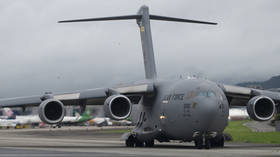TV channel apologizes for false China attack report

The Chinese Television System (CTS), Taiwan’s government-backed station, has issued an apology after mistakenly running ticker alerts about China striking targets near Taipei with missiles.
The warning appeared during a live news broadcast on Wednesday morning, with alerts reportedly indicating that a “war could break out,” as well as that Taiwan’s president, Tsai Ing-wen, had declared a state of emergency. According to local media, the viewers were also being informed about China’s missiles having hit warships and critical infrastructure in the vicinity of the capital, Taipei.
However, an anchor clarified during the 10am news bulletin that the alerts had in fact been meant for a drill involving the Fire Department in New Taipei City on Tuesday but had been accidentally displayed on Wednesday morning due to a technical error. She also called on citizens not to be “overly panicked,” and apologized for the mistake.
The false alerts, which had made it on air, did not cause mass panic in Taipei, according to Reuters.
Last week, Taiwan’s military released a survival guide designed as a comic-strip, which features recommendations for civilians in the event of a war. The booklet, among other things, explains, how to find bomb shelters via smartphone apps, to prepare emergency first-aid kits, as well as how to distinguish various types of air-raid sirens.
Additionally, there has recently been talk of extending compulsory military service for Taiwanese male citizens beyond the current four months.
Taiwan is a self-governing territory, which has been de facto ruled by its own government since 1949, when the losing side in the Chinese civil war fled to the island and set up its own administration there. China, for its part, considers the Taiwanese authorities to be separatists, insisting that the island is an inalienable part of China.
In recent years, Beijing has intensified its military activities in the Taiwan Strait, separating mainland China from the island. Top Chinese officials, including President Xi Jinping, have openly said that the use of force is one of the options on the table to ensure the ‘reunification’ of Taiwan with the People’s Republic of China.
Under the so-called ‘One-China principle’ or ‘One-China policy’, the vast majority of countries refrain from officially recognizing Taiwan’s independence.
Taiwan has, however, for years enjoyed extensive diplomatic and military support from the US, which maintains unofficial relations with the island. Washington has repeatedly warned Beijing of severe consequences if it attempts to take over Taiwan by force.
Since the start of Russia’s military offensive against Ukraine on February 24, Taiwanese authorities have raised their own alert level, admitting, however, that at present there are no signs of an imminent invasion by China.
Elected in 2016, Taiwan’s President Tsai Ing-wen has prioritized improving the island’s defense capabilities, with a major modernization program launched by her administration.













